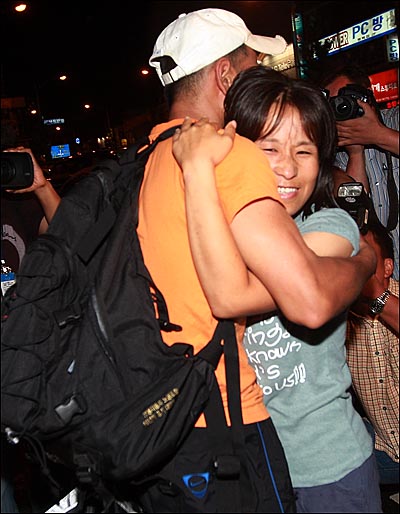PWC (South Korea)

[See also South Korea: Graphic photos, video -- Ssangyong sit-in workers' appeal: `Our lives are at stake'.]
By Young-su Won
August 6, 2009 -- After days of harsh and inhumane assaults by riot police and company thugs on striking workers occupying the Ssangyong Motor plant in Pyeongtaek, near Seoul, the Korean Metal Workers Union (KMWU) and management reached an agreement: the union accepted part of the company’s redundancy proposal, saving about half the strikers’ jobs, while the rest will apply for voluntary retirement or unpaid long-term leave, or accept another job with the spin-off company.
South Korea: The general election and leftwing politics
By Won Youngsu
April 30, 2008 -- For the South Korean left, the general election of April 9 was another fiasco following the presidential election last December, in which the election of Lee Myung-bak brought forth the return of the conservative government, while Democratic Labor Party (DLP) candidate Kwon Young-gil received just 3 per cent of vote, less than the previous result in 2002 -- a drop of 300,000 votes.
The DLP won two constituency seats and three seats from the party list, with 5.6 per cent or 973,345 votes. The DLP's seats were halved compared with the result of the previous election in 2004 of 10 seats, two constituency seats plus eight list seats, respectively. The Progressive New Party, which split from the DLP, won no seats; it obtained 2.94 per cent, less the threshold of 3 per cent. In sum, the two leftwing parties suffered defeats in the election.
Main results of the election
Conference reaffirms Marxism in the 21st century
"In the world, the tendency today is to bury Marxism and communism. The equation is simple: the collapse of the European socialist bloc is the end of the ideology and the theory that inspired their existence. But Marxist and communist ideas have today, perhaps more than ever, the possibility of demonstrating their viability.”
With these words Maria Luisa Fernandez, the Cuban consul-general, opened the Marxism 2000 conference in Richmond, just outside of Sydney, from January 5 to 9. Her speech followed a welcome by Colin Giles, a representative of the local Darug Aboriginal people.
Marxism 2000, initiated and organised by the Democratic Socialist Party (DSP), was the second Asia Pacific Solidarity Conference; the first was held in April 1998, also in Sydney.
Far from being a collective international obituary to the ideas and practice of Marxism, Marxism 2000 was instead a vibrant reassertion of the urgent need to build an alternative to the capitalist system and a reminder that such an alternative is the only way to solve massive global inequalities.
How an NGO-union partnership suffocated the anti-asem struggle in Korea
On October 20 (O20) and the days before, a series of lively demonstrations against the third Asia-Europe Parliamentary Meeting (ASEM) signalled Seoul's entry into the growing worldwide movement against the global generalisation of neo-liberalism.